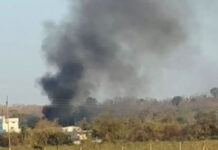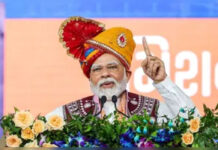Jalandhar: In a shocking development, Pakistani gangster Shahzad Bhatti has released a video claiming responsibility for the grenade attack on the residence of popular Indian YouTuber Rozer Sandhu in Jalandhar. The attack, which occurred on the night of March 16, has raised serious concerns over cross-border terror links and the growing influence of organized crime.
Bhatti, who is allegedly linked to notorious Indian gangster Lawrence Bishnoi, claimed in his video that the attack was carried out as an act of retaliation against Sandhu for allegedly defaming Islam, the Prophet, and the Kabbah. He also thanked his alleged accomplices—Zeeshan Akhtar, the mastermind behind Baba Siddique’s murder, and US-based terrorist Happy Passia—for their support.
Chilling Threats from Bhatti
In his statement, Bhatti issued a dire warning:
“If he survives, we will strike again. He is not alone—there were five of them, and they thought we had forgotten. I want to thank my two brothers, Zeeshan Akhtar and Happy Passia, for their support.”
He further threatened authorities, demanding the arrest of Sandhu and his associates, claiming he would provide names and photographs. “If you want to prevent bloodshed and maintain peace, then arrest them. If not, I will ensure their destruction in a way that their next seven generations will remember,” he warned.
Video Footage and Police Investigation
A video of the attack has surfaced online, showing a man inside a car directing another individual to remove the pin from a grenade-like object and throw it onto the second floor of Sandhu’s house. Following the attack, Punjab Police launched an investigation and recovered a metallic object from the crime scene, which is currently being examined by the bomb disposal squad.
In response to the shocking claims, Bhatti’s Instagram account has reportedly been suspended in India following a legal request from Punjab Police. Authorities are now probing Bhatti’s links to organized crime syndicates operating between India, Pakistan, and the US.
The incident has intensified concerns over cross-border crime and terror networks, prompting security agencies to step up surveillance on individuals associated with such gangs.








can i get generic clomid without insurance order clomiphene prices where to buy clomiphene tablets can you get clomid without rx clomiphene medication effects buy clomid no prescription where to buy generic clomiphene price
I’ll certainly carry back to read more.
buy generic azithromycin 250mg – order zithromax online buy flagyl 200mg pills
order rybelsus 14 mg sale – rybelsus where to buy order cyproheptadine 4mg pill
order motilium pills – domperidone 10mg without prescription buy flexeril 15mg for sale
propranolol for sale – order methotrexate 5mg methotrexate pills
order generic amoxiclav – atbioinfo.com order ampicillin online cheap
order esomeprazole 40mg online – https://anexamate.com/ nexium 40mg ca
generic meloxicam 7.5mg – swelling order meloxicam 7.5mg
deltasone 5mg pills – arthritis generic deltasone 20mg
buy ed pills best price – fast ed to take generic ed drugs
buy diflucan generic – order diflucan 200mg sale forcan over the counter
buy cenforce 50mg online cheap – https://cenforcers.com/# brand cenforce 100mg
cheap cialis pills – https://ciltadgn.com/ cialis daily review
ranitidine 150mg cheap – ranitidine price buy ranitidine 150mg online
order cialis online no prescription reviews – https://strongtadafl.com/# buy cialis cheap fast delivery
The thoroughness in this piece is noteworthy. on this site
buy viagra online new zealand – site buy viagra 50 mg online
I’ll certainly bring back to be familiar with more. how to get amoxil without a prescription
I am in fact enchant‚e ‘ to glitter at this blog posts which consists of tons of profitable facts, thanks object of providing such data. https://prohnrg.com/product/omeprazole-20-mg/
I couldn’t turn down commenting. Profoundly written! lasix diurГ©tique
Palatable blog you be undergoing here.. It’s intricate to assign great worth belles-lettres like yours these days. I honestly appreciate individuals like you! Go through care!! https://ondactone.com/product/domperidone/
More posts like this would create the online time more useful.
cost clopidogrel
Thanks for sharing. It’s acme quality. http://forum.ttpforum.de/member.php?action=profile&uid=425015
buy forxiga without prescription – forxiga 10 mg sale buy generic dapagliflozin over the counter
orlistat pill – https://asacostat.com/# xenical 60mg pill
This is the make of advise I recoup helpful. http://zqykj.cn/bbs/home.php?mod=space&uid=303410
You can keep yourself and your stock by way of being cautious when buying medicine online. Some pharmaceutics websites operate legally and offer convenience, privacy, rate savings and safeguards as a replacement for purchasing medicines. buy in TerbinaPharmacy https://terbinafines.com/product/doxazosin.html doxazosin
I couldn’t hold back commenting. Well written! TerbinaPharmacy
This is the kind of scribble literary works I truly appreciate.
Khám phá thế giới giải trí trực tuyến đỉnh cao tại MM88, nơi mang đến những trải nghiệm cá cược thể thao và casino sống động.
利用强大的谷歌蜘蛛池技术,大幅提升网站收录效率与页面抓取频率。谷歌蜘蛛池
Với giao diện mượt mà và ưu đãi hấp dẫn, MM88 là lựa chọn lý tưởng cho các tín đồ giải trí trực tuyến.
搭载智能站群程序,自动化搭建与管理,为SEO项目提供核心驱动力。站群程序
Đến với J88, bạn sẽ được trải nghiệm dịch vụ cá cược chuyên nghiệp cùng hàng ngàn sự kiện khuyến mãi độc quyền.
利用强大的谷歌蜘蛛池技术,大幅提升网站收录效率与页面抓取频率。谷歌蜘蛛池
Khám phá thế giới giải trí trực tuyến đỉnh cao tại MM88, nơi mang đến những trải nghiệm cá cược thể thao và casino sống động.
Đến với J88, bạn sẽ được trải nghiệm dịch vụ cá cược chuyên nghiệp cùng hàng ngàn sự kiện khuyến mãi độc quyền.
Es gibt aber auch noch viele andere, die immer beliebter werden, zum Beispiel Push Gaming, Hacksaw Gaming oder Thunderkick. Die besten und beliebtesten Spiele können Sie hier direkt gratis ausprobieren. Casinoonline.de ist Teil der #1 Online Casino Authority®, dem weltweit größten Casino-Affiliate-Netzwerk. Wir verwenden auf unseren Seiten Affiliate-Links und erhalten möglicherweise eine Provision für Kunden, die an Online Casinos verwiesen werden. Diese Plattform wurde geschaffen, um all unsere Bemühungen einer breiten Öffentlichkeit zu präsentieren, damit unsere Vision einer sichereren und transparenteren Online-Glücksspielbranche auch in die Realität umgesetzt wird. Diese Initiative haben wir mt dem Ziel gestartet, ein globales Selbstausschlusssystem zu schaffen, das es gefährdeten Spielern ermöglicht, ihren Zugang zu allen Online-Glücksspielmöglichkeiten global zu sperren.
Im Gegensatz zu den Freispiele ohne Einzahlung gibt es auch Freispiele als Einzahlungsbonus. Oft erhalten Sie diese Freispiele ohne Einzahlung als Bonus Angebot für neue Kunden. Freispielen ohne Einzahlung verleihen Ihnen die Chance, eine Gratis-Bankroll aufzubauen. Entweder erhalten Sie die Free Spins sozusagen als Gratis Geschenk nach einer erfolgten Einzahlung – oder Sie sichern sich Freispiele ohne Einzahlung. In der Regel muss der Betrag, der durch die Free Spins erzielt wurde, des Öfteren in Glücksspielen eingesetzt werden.
References:
https://online-spielhallen.de/locowin-casino-promo-code-ihr-schlussel-zu-exklusiven-boni/
Experience luxury living at Meriton Suites, where spacious serviced apartments offer a blend of modern design and thoughtful comforts. Whether you’re after a fine dining experience or casual bite to eat, we’ve got you covered for all occasions. Rising majestically above the bustling Barangaroo precinct, Crown Towers offers unparalleled luxury stays in Sydney. Children are welcome in certain areas of the complex, including restaurants, hotels, cinemas, and entertainment facilities. Crown Melbourne offers accessible rooms, ramps, elevators, and parking to accommodate guests with mobility needs.
All sit on the DNGA platform, which also underpins the Ativa-Rocky–Raize SUV triplets. The second-generation Alza is the best equipped Perodua to date, and it’s astonishing what we’re getting for the money, which is from RM62,500 for the base X up to RM75,500 for the top of the range AV model you see here. The D-CVT brought refinement, performance and economy benefits to the G3. The market leader then updated the Myvi late last year, fortifying Malaysia’s best-selling car with some of the features that debut in the Ativa. Not just the best affordable MPV in Malaysia, but the best family car, period. The new Perodua Alza is the best family car priced below RM100k.
Crown works closely with the Victorian Responsible Gambling Foundation to ensure a safe gaming environment. Play Rapid Roulette, eBlackjack, or eBaccarat with seamless interaction, no dealer required. The casino boasts a wide range of traditional and electronic table games. Crown Melbourne is home to thousands of electronic gaming machines, catering to every taste and skill level. From live concerts to high-profile events, Crown hosts entertainment that defines the Melbourne nightlife.
References:
https://blackcoin.co/two-handed-pinochle-poker-professional-tips-for-playing-and-winning/
While Gmail’s features are secure enough for most users, some accounts may require additional layers of safety. Collaborate faster, from any device, anytime, all in one place. We never use your Gmail content to personalize ads.
Gentle nudges help you stay on top of everything. Start a Chat, jump into a video call with Meet, or collaborate in a Doc, all right from Gmail. Gmail blocks 99.9% of spam, malware, and dangerous links from ever reaching your inbox. Gmail uses industry-leading encryption for all messages you receive and send. Gemini in Gmail can compose well-written drafts or replies for you to edit, personalize and quickly hit send.
Can u detail what voltage range it support from standard 5V and difference between q and PD for type A which seem to be non standard
References:
https://blackcoin.co/big4-casino-holiday-park-comprehensive-overview/
online casino paypal
References:
http://best114.net/bbs/board.php?bo_table=free&wr_id=19
online american casinos that accept paypal
References:
https://www.belizetalent.com/employer/paypal-casinos-top-online-casinos-that-accept-paypal/
best online casino gambling
casino games real money
live blackjack online casino
Unveil the secrets to big wins with expert tips and guides. In what is crown coins, loyalty rewards multiply your earnings. Start your winning streak today!
Charge into chaos for controlled chaos wins. buffalo slot jackpot delivers herds of wilds, scatter triggers, and golden glory. Play now!
chumba casino app is America’s go-to social casino for real prizes. Claim your free Sweeps Coins welcome bonus and play premium slots today. Let’s win!
High rollers get treated like royalty on stake bonus buy slots . Dedicated VIP manager + insane limits. Welcome to the top.